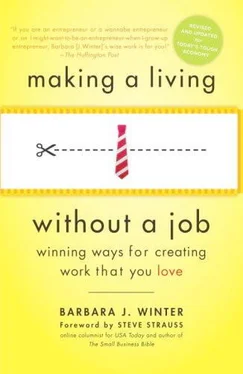What Winfrey—along with countless others who have made the same discovery—demonstrates is that our work can and should be more than just a means of paying the bills. It’s an idea that is gathering momentum as more of us question the choices and assumptions we have made about the role that work plays in our lives.
In fact, all sorts of people are deciding that they’d rather not be an employee, but they aren’t exactly traditional entrepreneurs either. Zappos’s founder, Tony Hsieh, is not only building a successful business, he’s demonstrating daily that it’s possible to create an enterprise based on clearly defined values. Zappos’s ten core values, which Hsieh has adopted as his personal values, include “create fun and a little weirdness, do more with less, be passionate and determined.”
“Passionate and determined” would describe Collette Morgan, owner of Wild Rumpus children’s bookstore in Minneapolis. Her idea was to build “something a corporate mind would never dream up and that a large company could never sustain.” To the delight of local children, Wild Rumpus is about having a good time as well as access to wonderful books. Chickens and cats roam the store, which is full of hiding places and secret nooks.
Not all entrepreneurs run shops, production studios, or large mailorder businesses, of course. Plenty of joyfully jobless folks are opting to create a one-person operation that may be run from home—or from wherever they and their laptop happen to be.
Yet few of us are in a position to do what one wealthy man did. Returning to his office in his chauffeured Rolls-Royce, this millionaire had a sudden urge to chuck it all and board his sailboat for a slow trip around the world. His story produced headlines that declared, “Wealthy Businessman Trades In Fortune for Happiness.” Perhaps. For most of us, making a dramatic lifestyle change requires more than a split-second decision. We need to plan, lay the groundwork, consider which parts of our life to keep and which to throw away. Walking away from a less-than satisfying career or relationship takes time—and courage.
An adage says, “There are three kinds of people in the world: those who make things happen; those who watch things happen; and those who don’t even know anything is happening.” Well, something is happening in the world of work. People are bravely demanding more. After examining the alternatives, many see that becoming joyfully jobless provides the greatest opportunities for financial, emotional, and even spiritual well-being in their workplace. These hardy pioneers are making things happen, often with spectacular results. Should you decide to join them, be prepared for some unexpected rewards and riches. Not only will you amaze yourself with a new enthusiasm and energy for your work, you’ll discover that you’re part of a growing trend, one that is more far-reaching than you may realize. You’re even going to have fun!
Remember the old slogan “What’s good for General Motors is good for the country”? But GM is no longer the role model of American business success. As I discussed in the previous chapter, other big businesses have also begun to lose their cachet, as well as the public’s belief that they are the foundation of our society’s economic health. Big business is truly no longer the place where the action is. The quiet revolution that is bringing us ever closer to a Small Is Better culture is making itself felt in the lives of millions of people who are thoughtfully questioning how they will earn their living. As Richard Branson says, “The world is a massively more hospitable place for entrepreneurs than it was twenty years ago.”
A study by the U.S. government reported that an estimated 38 million of us now work at home. The study also noted that these statistics are difficult to verify. Although these workplace revolutionaries have been making changes individually—and welcoming others to the movement—their very independence and unorthodox methods have given them a low profile. They quietly go about their business while staying out of the spotlight.
According to Link Resources, a New York-based research firm, approximately 39 million Americans do part or all of their work at home, and the numbers keep growing. Whatever the correct number, it’s clear that we no longer agree that a commercial setting is the only proper place to work.
This workplace movement has its proponents reporting changes beyond just a shift in office space. In one survey, respondents pointed out additional advantages of leaving the nine-to-five world behind. The survey reported that 85 percent feel more relaxed working from home, 40 percent enjoy a healthier diet, 39 percent take more time off, 38 percent exercise more often, 32 percent feel they have a better marriage or sex life, 98 percent are happier in general, 96 percent would recommend working from home to other people, and 88 percent say they would never return to the corporate world again.
What this study suggests is that the rewards of making a living without a job go far beyond eliminating the hassles of commuting or dealing with incompatible coworkers. Whatever the reason for trying to work on our own, most of us have been pleasantly surprised that being joyfully jobless led us to being joyful in other ways as well.
It’s important to realize, however, that you have to be working at something you love in order to receive the other benefits. Deb Leopold is a bubbly, enthusiastic self-bosser who started First Class, an adult learning center, in Washington, D.C., more than twenty years ago. Leopold had worked for a similar program for several years and is still a confessed “seminar junkie,” who says she could happily attend a class every day of the year. Coupling her passion for adult education with a desire to own her own business was her motivation for opening First Class.
During the time she’s been running her business, half a dozen other independent programs have come and gone. Why has she outlasted the competition? “Probably because I love what I’m doing so much,” she surmises. “I know that at least a couple of the other programs were started by people thinking they would make a financial killing in this business. Even though I have part-time help, this is a very hands-on business for me. I plan the catalog, schedule the teachers, and take registrations over the phone. I want to bring good classes—and unique ones—to the community. I want other people to have as much fun learning as I do.”
Deb Leopold’s attitude about her venture is echoed by successful self-bossers everywhere. Our work can be far more than simply a way to earn money; it can be a vehicle for making a unique contribution to our community and our world. This attitude pervades any discussion with the joyfully jobless. It’s a stunning contrast to the disgruntled complaints we often hear from the employed.
Despite the fact that we who are making a living without a job are almost universally enthusiastic about this lifestyle, we inevitably face questions from the astonished and skeptical. When people discover that I’m jobless, they bombard me with questions. Don’t you get nervous not having a regular paycheck? Have you taken a vow of poverty? Do you live on rice and beans? Have a trust fund? Do something illegal? Do you have health insurance? (The answers, by the way, are no, no, no, no, no, and yes.)
Updating an Old Tradition
Should you decide to make a living without a job, you’ll be part of an old tradition—and on the leading edge of a new working movement. What seems to be a revolutionary lifestyle is really as old as the American Revolution.
Our wise forefathers envisioned a land where free enterprise would be a significant key to the growth and development of this fragile new nation. So important did they believe this system to be that John Hancock declared, “The more people who own little businesses of their own, the safer our country will be… for the people who have a stake in their country and their community are its best citizens.” Not only would self-employment bring financial rewards, it would have a positive impact on the social structure where it was practiced.
Читать дальше












